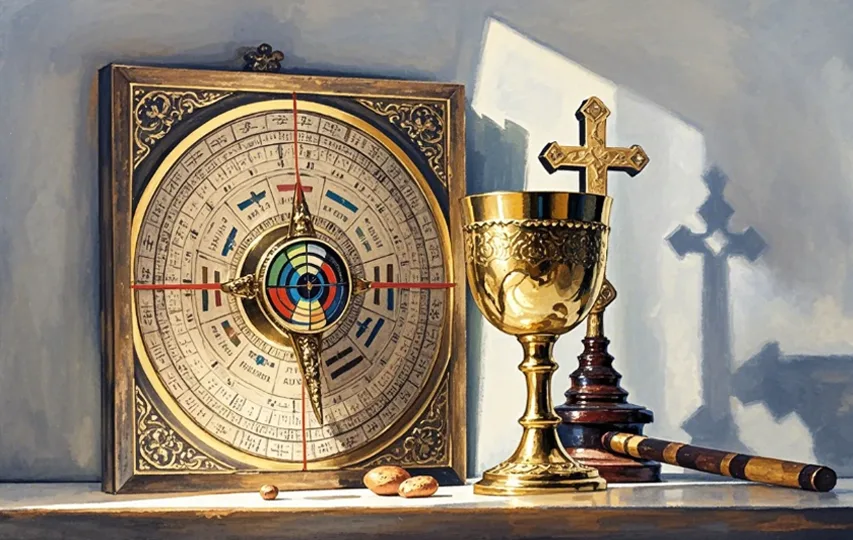In a world full of diverse beliefs and practices, the intersection of Feng Shui and Christianity often raises questions and misunderstandings. Let’s explore this topic thoroughly to foster greater understanding and remove any doubts.
Understanding the Purpose of Feng Shui
Feng Shui originated in ancient China with the goal of creating balanced and harmonious environments. Its main purpose is to optimize the flow of energy, or “Qi,” to enhance opportunities for success and happiness. Essentially, Feng Shui aims to create a positive atmosphere that supports personal growth and prosperity. By arranging furniture and décor in specific ways, practitioners believe they can influence luck and attract beneficial energy.
Feng Shui involves analyzing the layout of a space to determine how energy moves within it. Using tools like the Bagua map or the Five Elements theory, practitioners identify areas that may block or boost the flow of positive energy. Recently, “body Feng Shui” has gained popularity, aligning personal energy with the universe, often using Feng Shui bracelets to enhance balance in one’s life.
It’s important to understand that Feng Shui’s goals do not conflict with religious beliefs. Rather, Feng Shui complements them by offering insights into creating an environment that supports optimal energy flow. Feng Shui is not a religion; it’s a practice deeply rooted in Chinese culture. For those following religious traditions, incorporating Feng Shui concepts into their home or place of worship can be an additional way to cultivate positive energy, helping create spaces that foster focus, peace, and spiritual connection.
Is Feng Shui a Religion? Debunking Misconceptions
Contrary to popular belief, Feng Shui is not a religious practice. It is a system based on the ancient Chinese philosophy of energy flow and spatial arrangement. While certain cultural or spiritual elements may be associated with Feng Shui, it doesn’t require adherence to any particular religious faith.
Not Religion-Based
Feng Shui is often misunderstood as being linked to religious practices, but this is not the case. It is rooted in the concept of “Qi,” or life energy, which exists in all living things. Feng Shui’s goal is to harmonize this energy in our surroundings to improve well-being. It doesn’t involve worship or rituals tied to any specific religion.
Principles of Energy Flow
The core of Feng Shui is creating balance and harmony by optimizing the flow of energy in the environment. This involves arranging furniture, objects, and spaces in a way that boosts positive vibrations while minimizing negative influences. By considering factors like light, color, and positioning, Feng Shui aims to create an atmosphere that supports health, happiness, and prosperity.
Cultural and Spiritual Elements
While Feng Shui is not a religion, it does have cultural and spiritual roots. It draws from ancient Chinese philosophies, incorporating concepts like Yin and Yang (the duality of opposing forces) and the Five Elements (Wood, Fire, Earth, Metal, and Water). When these elements are properly balanced, they are believed to influence different aspects of life.
Compatibility with Religious Beliefs
One of Feng Shui’s strengths is its compatibility with various religious beliefs. Since it doesn’t demand specific religious practices or directly conflict with any faith, individuals can incorporate it into their lives without compromising their spiritual beliefs. This means Feng Shui and Christianity can coexist harmoniously.
How Feng Shui Enhances Spiritual Well-being
Feng Shui is more than just rearranging items or decorating spaces. It can actually have a positive impact on spiritual well-being. By aligning the energy fields of physical spaces and the body with positive vibrations, Feng Shui creates an environment that fosters inner peace and supports spiritual practices.
Creating a Harmonious Space for Inner Peace
When you incorporate Feng Shui into your surroundings, you create a harmonious space that promotes tranquility. This is especially beneficial for those seeking to enhance their spiritual well-being. By arranging items or wearing Feng Shui bracelets in a way that allows positive energy to flow, you create a space that feels balanced and calm.
Supporting Meditation and Mindfulness
Feng Shui can also support meditation and mindfulness practices. When your environment is tidy and orderly, it’s easier to focus and quiet the mind. A peaceful environment sets the stage for deeper connections with yourself and the divine. Whether through a dedicated meditation space or simply creating a calming atmosphere in your home, Feng Shui can enhance your ability to engage in spiritual practices.
Enhancing Serenity and Connection
By integrating Feng Shui principles into your living space, you invite positive energy into all aspects of life—including the spiritual. The alignment of Yin and Yang energies in your surroundings promotes balance, which is essential for overall well-being. When you feel at peace in your environment, it becomes easier to connect with a higher power or engage in religious rituals.
Embracing Feng Shui Without Compromising Faith
In summary, Feng Shui and Christianity can coexist in harmony. Feng Shui is not a religious practice but a system designed to enhance the flow of positive energy in our surroundings. It can be seen as a tool that complements and supports your existing faith and practices, not as something in conflict with them.
By understanding the goals and philosophy of Feng Shui, you can incorporate its practices into your life while remaining faithful to your religious beliefs. It’s all about creating harmony and balance in your environment, which aligns with many spiritual teachings across different faiths. Continue exploring how Feng Shui can enhance your spiritual well-being without any conflict or compromise.
Potential Conflicts and Solutions Between Feng Shui and Christianity
Theological Conflict:
Feng Shui’s core principles stem from Taoist beliefs about energy flow and Yin-Yang balance. Some Christians may view these ideas as conflicting with Christian theology and monotheism.
Solution: While rooted in Taoism, Feng Shui focuses on harmony with the environment and doesn’t require worship. Christians can see it as a tool for well-being without embracing Taoist theology.
Concerns About Idol Worship:
Feng Shui often includes symbols, icons, and objects like Bagua mirrors, wind chimes, and specific statues. Some Christians worry these items could be forms of idol worship.
Solution: Using Feng Shui symbols is not equivalent to idol worship. Just as Christians may use decorative crosses or Bible verses at home, Feng Shui items can be viewed as symbolic, not sacred.
Fear of the Occult:
Some Christians equate Feng Shui with mystical or pagan practices and fear it may inadvertently introduce negative spiritual forces.
Solution: Feng Shui is about aligning with natural energy, like “Qi,” which is not seen as mystical or supernatural. It’s more akin to architecture or environmental psychology than mysticism.
By addressing these concerns, Christians can embrace Feng Shui practices in a way that aligns with their faith while benefiting from its potential to improve well-being and create a harmonious living space.
FAQs
Can Feng Shui Be Practiced Alongside Religious Beliefs?
Absolutely! Feng Shui transcends religious boundaries, making it accessible to individuals from all faiths. Its main purpose is to harmonize your environment, and it can enhance your spiritual or religious life rather than conflict with it.
Is Feng Shui Compatible with Christian Values?
Yes, Feng Shui does not contradict Christian teachings. It’s about organizing your space to promote balance and positive energy, which can complement rather than challenge Christian principles. Actions like clearing clutter and arranging items for harmony align with a healthy, balanced lifestyle.
Is it Okay for Christians to Wear Feng Shui Bracelets?
Yes, Christians can wear Feng Shui bracelets. These bracelets are often worn for their beauty or symbolism and do not necessarily conflict with Christian beliefs. As long as faith remains focused on spiritual teachings, wearing a Feng Shui bracelet is a personal choice without religious conflict.
Does Feng Shui Conflict with Catholic Teachings?
No, Feng Shui is not contrary to Catholic values. It is a system aimed at enhancing the flow of energy in a space, fostering well-being. Since it is not rooted in religious doctrines, it can be practiced alongside Catholic faith without any contradiction.
Can Muslims Practice Feng Shui?
Yes, there’s no conflict between Feng Shui and Islamic principles. Feng Shui focuses on improving the energy within your surroundings, which can coexist with Islamic values such as cleanliness, balance, and tranquility in one’s home.
Are There Any Risks Involved in Feng Shui?
Feng Shui itself poses no inherent dangers, but misunderstandings can arise. Some people might expect it to bring quick wealth or success, which can lead to disappointment if expectations are unrealistic. It should be seen as a tool for enhancing balance, not a guaranteed solution to problems.
Can I Incorporate Feng Shui Alongside My Current Rituals?
Yes, you can easily integrate Feng Shui with your existing spiritual or cultural rituals. Feng Shui enhances the energy flow of your space, helping create an environment where your personal practices and traditions can continue harmoniously.
Is Feng Shui Just for Spiritual Purposes?
No, Feng Shui is a holistic practice that goes beyond spirituality. It aims to improve all aspects of life, including health, relationships, and personal success. Whether you’re seeking spiritual fulfillment or simply want to create a more balanced living environment, Feng Shui can be beneficial.
Get to Know Your Five Elements for Free
Get to Know More about Feng Shui













